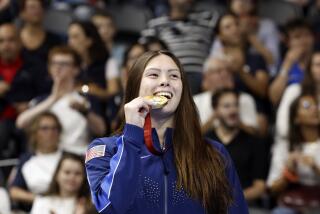Q & A WITH SCOTT TINLEY : Triathlete Enjoys Long-Running Success, Doesn’t Foresee an Imminent Slowdown
- Share via
Scott Tinley started competing in triathlons in 1976, in the days when the sport was most often known as a grueling, masochistic endeavor, if it was known at all.
Since then, triathlons have proliferated in a variety of distances, including mini-triathlons for weekend athletes and, of course, the famed Ironman at Kona, Hawaii--a 3.8-kilometer swim (2.4 miles) and 180-kilometer bike race (111.6 miles) topped off with a marathon.
Other triathletes have won more often and won more money than Tinley, who grew up in La Mirada and went to Fullerton College before graduating from San Diego State, although he does have three of the five fastest times at Ironman distances. But the breadth of his endeavors outside of competition is not easily matched.
Tinley, a Del Mar resident, has translated his renown into numerous business ventures. His name is sewn into a variety of athletic apparel known as Scott Tinley Performance Wear Clothing, a business he started in 1984 with three partners. In 1986, he released a book, “Winning Triathlon,” and in 1988, a home video, “Triathlon Training with Scott Tinley.”
And at 32, the 6-foot, 155-pound Tinley shows no signs of slowing down.
Question: Talk me through a normal day for you.
Answer: First of all, my days aren’t normal in comparison to anyone else’s. Each day is a little bit different, but basically it includes about 6 1/2 to 7 1/2 hours of training and at least a couple, two or three hours of work. I try to spend an hour or two with my daughter (Torrie, 20 months), and my wife (Virginia). The rest is just made up of little things that are necessary to live day-to-day life. Eating, sleeping.
Q: So often when people have children, it changes the way they think about their daily lives. Has the way you think about training changed since the birth of your daughter?
A: Yes and no. I was fairly well prepared. I knew that having a child would cut into the amount of discretionary time I had for myself, so I was prepared for that.
It hasn’t affected my training other than I think I’m more aware of exactly how much time I have to accomplish what I want to accomplish. Let’s say I flit around for 20 minutes doing something completely unnecessary. That time is going to come from someplace else, either the amount of time I have on my bike or the amount of quality time I spend with my family.
But all the time that I spend with my daughter I consider the most rewarding out of everything else that I do. Even though it’s the most subjective time. It’s just that you can’t really measure the time you sit around and play blocks with your kid. You can’t really measure that in relation to maybe like going out on my bike for a 30-mile time trial. Then, well, I know exactly . . .
Q: So how fast did you and your daughter build the blocks?
A: You don’t like to do that. There’s a real tendency to go that far, not only when you have a personality like I do, which is fairly obsessive at times.
When you start undertaking all these different activities, it’s very easy to get too type-A. You don’t want to be that way all the time. Not only is it very unhealthy, but I think your quality of life goes down, because you end up being driven and very mechanical and efficient, but you don’t enjoy what you’re doing because you’re always worried about time and performance and rewards.
Q: Would you say most triathletes have type-A personalities?
A: It’s hard to stereotype them, but I’d say the sport has attracted a lot of individuals who are goal-oriented, who are motivated by success, whether it be in business, in academics, in life in general. When you have a group of individuals like that, it’s very easy to say everybody who competes in triathlons is a workaholic. That’s not necessarily true.
Q: You’ve written about the demographics of the sport, that there are a lot of people in their mid-30s, very successful who are getting into triathlons. What does that mean for the sport? Is this a trend, the way tennis was in the ‘70s? Is that a possibility? Can the sport avoid that? What do you think, basically, of the future of this sport?
A: I think because the demographics are such, at least from what small studies we in the sport have found to show, I think it’s a positive sign for the future of the sport for a number of reasons.
First of all, when you have people who are like ‘the average person’ involved in the sport, they usually do it for a loftier reason than something they might do on a fad basis. They do it because it fits into their life style, or they want to be a part of a sub-culture that is going to provide them with certain intrinsic rewards which they may not be able to achieve being involved in weekend softball.
I think when corporations look at being involved in certain areas of sports marketing, they may look at triathletes as athletes who have a fair amount of discretionary income who they would like to be involved with because the sport in a lot of ways exudes success, and people who have been successful in life in general. So they infuse corporate dollars into the sport, which filters all the way down. There are more races, more opportunities for athletes making a living on a professional basis.
Q: How many triathletes are there earning a living off this, a real living?
A: Not many. Two to three dozen, maybe. And maybe there’s twice that many who can get by, who would call themselves professional triathletes. But a lot of those individuals are living on student-level incomes. Their emphasis really is on getting by, on doing it as a kind of diversion for a year or two until they decide what they want to be when they grow up.
It used to be a few years ago, when the sport was just beginning, that the definition of a professional triathlete was a lifeguard who didn’t know what he wanted to be next.
Q: Are you, with the clothing line and everything, the most financially successful? Plus, you have won a few races.
A: I can’t really say that. It’s all relative. There are a couple of other athletes--one in particular--who have no doubt won more major races than I have, and won more prize money.
Q: Who’s that?
A: Mark Allen, and of course I guess you could put Dave Scott in that category, too. Both those guys have won major races and have very lucrative endorsements.
My involvement with the clothing company is more on an equity basis, where I’m a shareholder, as opposed to being paid for endorsing. It’s relative again, because you look at how much work we’ve put into our sport, and look at what we as the top three or four people in our sport make, and then you look at what somebody, say a professional baseball player makes, and it doesn’t exactly equate. That basically has to do with professional athletes being more or less entertainers, and the entertainment value in triathlons isn’t very high because of the feasibility of it. The logistics are such that it’s very hard to watch an event.
Q: Has that ever rankled you, where you say, ‘Hey, I’m a world-class athlete, yet I don’t get rewarded in the same way as these other world-class athletes?’?
A: No. I look at the fact that I’m very, very lucky to be able to even learn a living at all doing something that I enjoy. Even though I treat my chosen profession as a job and I work very hard at it, at the same time I realize that there’s a lot of people out there who would like to trade places with me, no matter how hard my workouts are.
Q: Do you see the day when the slowdown will come? Have you limited your competitions at all now that you’re 32?
A: You know, I haven’t. A couple of years ago, I sort of figured, well, maybe I’ll compete for five more years. I figured, well, eventually age is going to catch up with me physiologically, and I’m not going to be able to compete at a world-class level. Yet it’s been real interesting, over the last year-and-a-half to two years, I’ve continued to get faster. Even though there’s much more competition from talented, younger guys coming up, I’ve still been able to maintain, not my dominance, but at least my ability to be in the hunt in 90% of the races I enter.
So I don’t want to put a limit on the number of years I’ll continue to compete. I think that’s sort of self-defeating. I mean, it would be obvious to me when the time is to readjust my priorities. But right now, I’m not going to say another two years, another 20 years. I’ll take it sort of one year at a time.
Q: In a lot of other sports, you train for the competition. If you could get by in the competition without training, you probably wouldn’t train if you were a football player or a basketball player. In this, it seems like the training is the very essence of it, maybe as much as the competition. Is that true? How do you feel about that? How much of the reward is in the training?
A: That’s a really good point, because I look at what I do, and sometimes I think that even if there weren’t races, I might do it anyway. There are a lot of rewards in the day-to-day training that you can’t really put a finger on. Just the fact that on a nice day when the sun’s out, you can go out and go on a four-hour bike ride with a friend. And even though during parts of that ride, you’re going to be extremely uncomfortable because of the level of training, the level of speed attained, all in all, it’s a nice place to be. The other part of the deal is you may end up doing that same bike ride in the rain by yourself, wondering why you aren’t sitting behind a desk. It’s a package deal.


